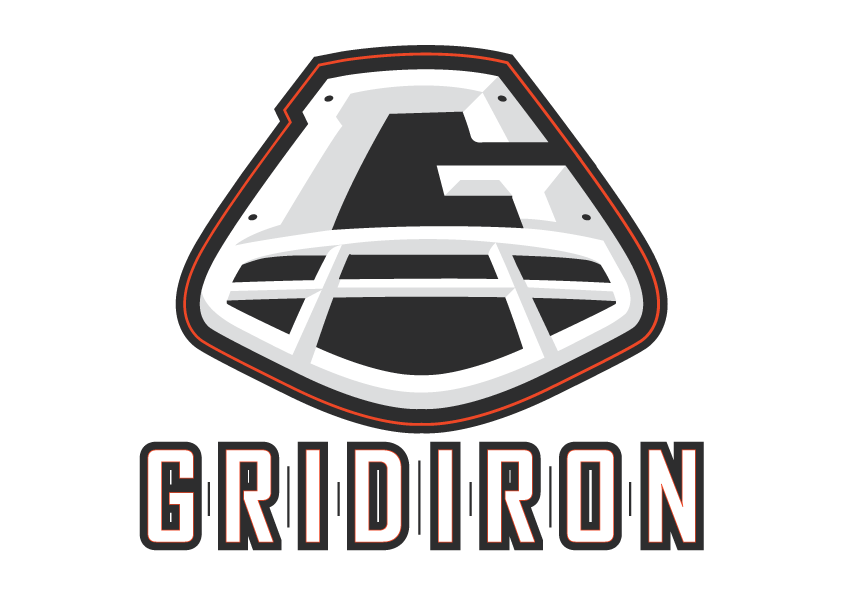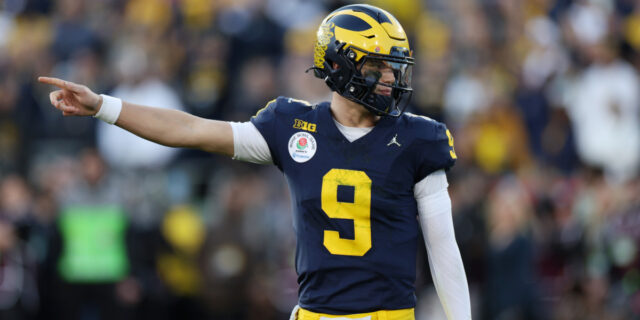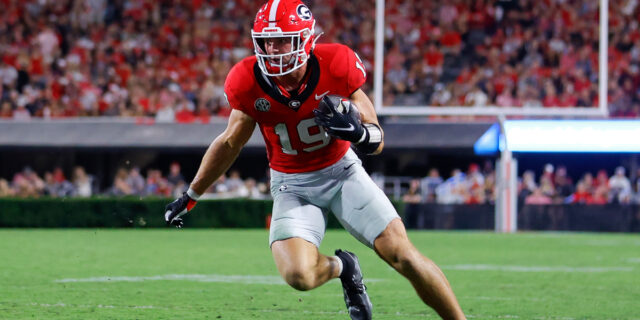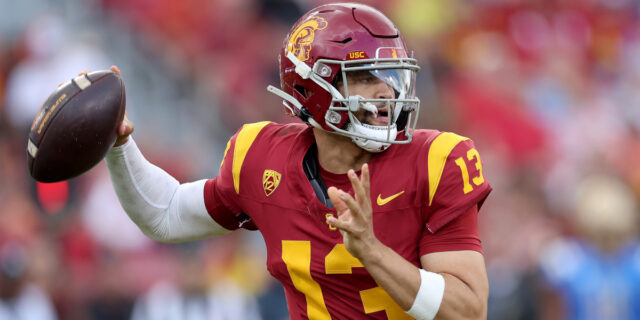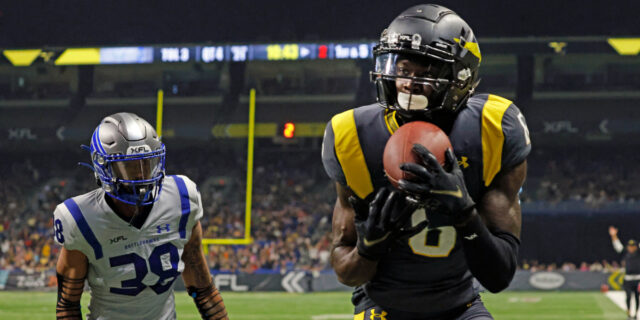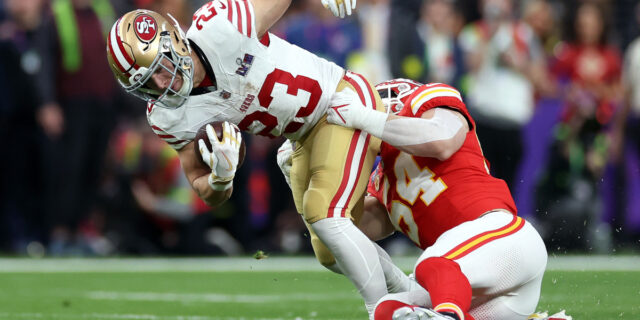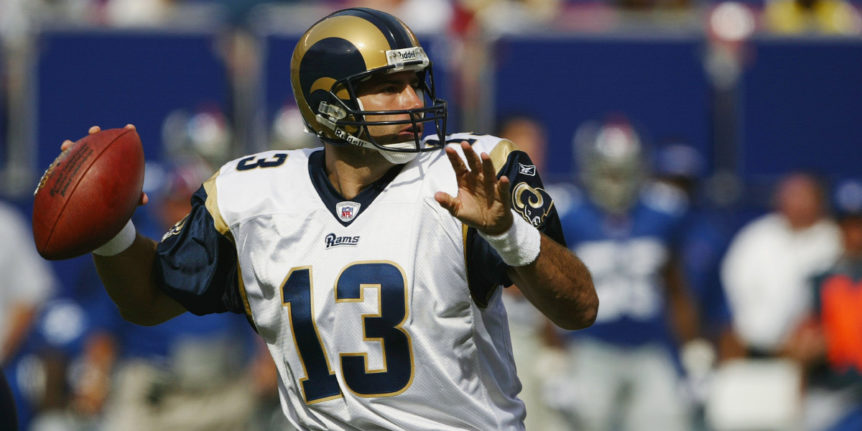
From Superstore to Superstar
This article, from Issue XXXIV of Gridiron magazine, originally appeared in 2017. For individual editions or subscriptions, click HERE
“Man, I wasn’t sure if this moment was ever going to come. People say Hollywood could not have written it better. Now, they don’t have a chance.”
Quite right. Of all the 310 men who’ve stood at the Pro Football Hall of Fame podium, donning their sparkly gold jackets, the man who occupied the stage for 32 minutes, 49 seconds on August 5 2017, beaming his way through a typically impressive speech, might have had the unlikeliest journey. For the setting and attire were the culmination of perhaps the NFL’s most remarkable Cinderella Story.
“That’s the thing I’m most proud of – when you play this game you want to do something that nobody has done before,” Kurt Warner tells Gridiron. “I want to set this record or play in this many Super Bowls. But now I’m in the Hall of Fame and I’m the only guy who played in NFL Europe going into the Hall of Fame. I’m the only guy who played a significant amount of time in the Arena Football League who is going into the Hall of Fame. Very seldom do you see a Hall of Fame quarterback play with two different teams like I did.”
Warner is probably the only person whose first job out of college was stacking shelves to reach the Hall too.
Of all the stories told in this underdog edition of Gridiron, his might be the most well-worn. Quarterback at Iowa State… undrafted and cut by the Green Bay Packers… shelf-stacking in a grocery store… Arena League… NFL Europe… Greatest Show On Turf… Eli Manning’s placeholder… Arizona Cardinals swansong. His tale is one of constant clawing, fighting and, ultimately, defying the odds.
“I want people to remember the fact that, when all the odds were against him and everybody said that he couldn’t, he found a way to get there and not just get there but finish on top of the mountain,” Warner continued. “That’s so encouraging. At the end of the day, I know I played a game for a living and I loved that game. Everybody has got their thing and their dream and that is what my story has always been about.
“Whatever your dream is, you might find yourself in a tough spot, you might find yourself working in a grocery store, you might find people telling you you’re not good enough – but that doesn’t have to be the end of the story. That’s what I’m most proud of. When nobody thought I could, I showed people that I could and to all those listening, now it’s your turn. Go and show everybody that you can be something that probably only you believes you can be.”
This fable is one that, in the small Ohio city of Canton this past August, got the ultimate ending as Warner celebrated his place in the Pro Football Hall of Fame.
“Four consecutive years on the bench. Let’s have a show of hands for everyone who spent four successive years on the bench in their entire lives.”
The Kurt Warner that Gridiron meets is very different to the Kurt Warner who was so badly overlooked at small-school Northern Iowa. Now, he is a larger than life figure in any company. Over our two days behind the scenes of the NFL UK Live Tour with Warner, we saw him equally adept chatting to us, England cricketer Jake Ball and answering the many, many questions asked between stops by Washington quarterback Kirk Cousins. He was the undoubted star of the outstanding stage show orchestrated by our very own Neil Reynolds too, bringing wisdom, fun, energy and, of course, that golden smile.
In fact, the only time he looked remotely unsettled is when, donning pads and a helmet on the square at Trent Bridge, he faced balls from Ball. But, even then, he eventually figured it out, unfurling an ungainly, but well-timed, back-foot mow straight past the bowler.
The word Gridiron took away? Adaptability. Whatever the situation, Warner could handle it. And that’s perhaps unsurprising given his route to the top, which started in Burlington, Iowa, with Kurt playing in carparks and fields with his two brothers called Matt (yes, both of them), and ended on the podium in Canton. In between, there were many twists and turns, the first of which came at Northern Iowa – where Warner, as he eluded to in his speech, was far from a star.
“We didn’t have a lot of money at the time, so I just took the opportunity to play football,” he explained. “The most frustrating part then was not getting the opportunity to play but, every time they gave me the ball, I was successful. There were definitely times that I wondered whether I should do something else, but I really felt I could compete at that level.”
Warner spent his first four seasons of that run warming the bench for the Division I-AA programme, watching others take snaps under centre, before finally being named starter as a senior. He rewarded their eventual faith by passing for over 2,700 yards and 17 TDs on a team that went 8-4 and made a run to the playoffs, earning himself Gateway Conference’s Offensive Player of the Year honours in the process.
“Kurt represents what we believe Northern Iowa is about and that’s perseverance,” Northern Iowa football coach Mark Farley told ESPN, having been impressed with the youngster’s work ethic, “Nothing was given to him. Everything was earned. He didn’t wait for his senior season to start working out. He was training to be the starter. He just worked. He didn’t talk a lot. He didn’t do a lot. He just worked.”
By the time his college days were done, however, the long-standing dream of the NFL was distant. By the time he had been released as an undrafted free-agent by the Green Bay Packers, it was seemingly dead. Warner was suddenly, and now infamously, earning $5.50 an hour stacking shelves at a HyVee grocery store. “I’d work nights stacking shelves and look after the kids in the day, and work out in the days to stay ready. But I knew I needed to change course; no NFL scout comes running into aisle seven at 3am looking for their next QB.”
But the start of his new course would come on one of those night shifts. “I was stocking a cereal aisle and I saw Dan Marino on the back of one of the boxes. Wherever I went, it was like his eyes were following me, imploring me to do more.”
Within five years, Warner was alongside Marino as one of only two players to have thrown 40 touchdown passes in a single NFL season. And he’d also surpassed the former Miami Dolphins great in one key area: by winning a Super Bowl. That moment is one of two Warner cites in describing his journey from the shelf to the field. The second is the story of Kurt having to persuade a gas attendant for free fuel just to get him, his wife Brenda and two kids home. He decided his kids deserved better, so he set about making it happen.
“The road to our dreams often has detours. Sometimes you have to do what you got to do, while you’re waiting to do what you were born to do.”
Warner’s first stop on the road to redemption wasn’t in some glamorous ‘Jerry-dome’ or Lambeau Field, but in the company of pro football’s bastard brother: The Arena League. The Iowa Barnstormers were one of the league’s first expansion teams and Warner – filling time as a graduate assistant at his alma mater – was suggested to coach John Gregory.
“We were searching for players, especially players from Iowa, and Kurt was pretty good on the game tape I had,” Gregory says. “We brought him in for an open workout, he played well, so we signed him.”
The Barnstormers made the Arena Bowl in two of their first three seasons with Warner at the helm, coming up short both times, and the QB was named to the AFL’s All-Arena team in both 1996 and ‘97.
“Kurt was a class guy to work with – he was smart and picked things up quickly,” Gregory continues. “Although he didn’t have very good speed, he had what I would call ‘basketball quickness’. He got out of trouble with his ability to slide one way or another. He had great downfield vision and was able to make plays on the run.”
Warner would later be inducted to the Arena Football Hall of Fame, and named among the best 20 players ever to grace the indoor game, but still longed for the break that might give him an NFL career.
“For a long time, I convinced myself I could will my way to my dream. But if there’s one great truth I learnt from this game, it’s that no great accomplishment could be achieved by yourself. It always starts with someone taking a chance on you.”
Warner’s someone was Al Luginbill, head coach of the Amsterdam Admirals. “I told him that, if he could get an NFL team to sign me, I’d go. The first year he tried, nobody bit. The next year he called me again. He tried 12 teams. They all said no, but the 13th – the St. Louis Rams – said yes. I had the worst workout of my life and told Brenda I’d blown it. And then they gave me a contract, probably as a favour to Al.”
Signed to a ‘futures’ contract, Warner was allocated by the Rams to NFL Europe’s Admirals in a bid to build his experience during the 1998 offseason. Backed up by future Carolina Panthers Super Bowl quarterback Jake Delhomme, Warner would go on to make an immediate impact on the development league, which he led in both passing yards and touchdown tosses as Amsterdam turned in a 7-3 record to finish third overall in the standings.
“The Arena and European leagues were instrumental for me,” Warner admits. “I went from being a guy that really only played one year in college to having so many reps playing Arena Football, and then even more reps in Europe. I got to grow up as a football player, and got to experience so many different scenarios on the field, and that was so valuable to me.
“The nature of the Arena League, the speed of the game, the accuracy that needed to be developed, the way you had to move within the pocket, the confidence of what the field was like… Those things that were so instrumental in being successful in the Arena League would also become my strengths on the big field at the NFL level.
“You knew you weren’t going to win games handing the ball off. You were going to win the game by making throw after throw after throw, scoring touchdown after touchdown. Every time you stepped on the field, it was like a two-minute drill, and there were so many things that I learned and developed in those four seasons that were vital to me being ready and prepared when I got my opportunity with the Rams.”
Returning from Europe after one season, Warner was briefly put through the mill again, offered up to the returning Cleveland Browns as part of the 1999 expansion draft. Overlooked in favour of Scott Milanovich, he returned to St. Louis where, with Tony Banks and Steve Bono moving on, he stepped into the role of second-string QB behind new signing Trent Green – only for fate to accelerate his ride up the depth chart.
When Green tore his ACL in a pre-season game, head coach Dick Vermeil – who had told Warner in 1998 that ‘the reason you made this team is I felt there’s something special about you and I couldn’t let you go without finding out’ – opted to promote the backup to starter and, no doubt contrary to expectation, was rewarded with one of the greatest seasons in NFL history.
Surrounded by stars such as Marshall Faulk, Isaac Bruce and Torry Holt, Warner threw for 4,353 yards and 41 touchdowns, including a record three in each of his first three starts, as the Rams registered the first of three straight 500-point campaigns. He overturned a 17-game losing streak to NFC West rival San Francisco with a five-touchdown barrage in St. Louis and was named NFL MVP at season’s end after guiding the Mike Martz-designed offense dubbed ‘The Greatest Show On Turf’ to the Rams’ first division title and playoff appearance since fleeing Los Angeles 10 years earlier.
That unexpected form continued into the postseason, where St. Louis saw off Minnesota and, in a defensive struggle, Tampa Bay to reach Super Bowl XXXIV against the Tennessee Titans. There, Warner again came into his own, throwing for two touchdowns amid a then Super Bowl-record 414 passing yards on 45 attempts, including the 73-yard bomb to Bruce which proved to be the game-winner when Kevin Dyson came up a yard short of the Rams’ goalline at the death.
“To be able to step on the football field as I had dreamed about in my front yard a million times and throw a touchdown pass as time is running down in the Super Bowl to seal the victory, it doesn’t get any better than that,” Warner reflects, “That’s what every kid dreams about their entire life growing up. You watch all the great ones, you remember the great ones that did it on the biggest stage… that’s what the dream is. To have all that play out my first season starting in the NFL, and to win a Super Bowl with the Rams has to be the crowning moment in the big picture.”
His individual performance not only confirmed Warner as the game’s MVP, but also earned him a seven-year $47m extension his contract, cementing his coveted place in the professional game. He proved it was no fluke too, overcoming a broken hand that allowed Green a brief return in 2000 to retake the reins and reclaim league MVP honours in 2001. The Rams even returned to the Super Bowl, although ‘The Greatest Show on Turf’ was ultimately muted by an emerging duo named Brady and Belichick despite Warner’s heroics drawing the sides level in the closing stages.
“To those listening tonight, don’t miss your moments. We have no idea today which moments will leave the most indelible mark tomorrow. We must take advantage of every single one.”
Even after the Super Bowl, the Greatest Show On Turf, all the achievements, there were more chapters to be written with additional upheaval. After a couple of down years in St. Louis, Warner was released in 2004 with three years left on his contract.
It took only two days for him to be snapped up, as the New York Giants tabbed Warner to be their starter while rookie phenom Eli Manning found his feet. But winning five of seven to open the season counted for little and, as soon as Warner followed that with a two-game skid, Manning was under centre. The Giants went 6–10 overall. Even when voiding the option on his contract, however, Warner took something from his brief spell in the Big Apple.
“I don’t know if the mentoring process helped me from a football standpoint, but I think every opportunity that I was faced with throughout my career – good, bad, indifferent, starter, backup, mentoring – all helped shape me as a person,” he explains. “You like to think that you had maybe a little hand in the great success that Eli had because you were there at the start and maybe gave him some small piece of advice or he saw something in you that he was able to take and apply to his game.”
Having again become a free agent, Warner signed a one-year deal in Arizona, quickly being named as starter by coach Dennis Green, but it wasn’t until 2008 that the relationship began to bear fruit. Having struggled with injuries and endured a job share with both Josh McCown and Matt Leinart before that, Warner finally seized the starting role, guiding the Cardinals to their first division title since 1975.
The run continued with postseason victories over Atlanta, Carolina and Philadelphia as Arizona made it to a Super Bowl XLIII showdown with Pittsburgh, making Warner only the second quarterback to appear in the big game with two different teams. The swansong did not have a happy ending as, despite throwing for three touchdowns and 377 yards – to claim the then three highest single-game passing totals in Super Bowl history – Warner and the Cards went down 27-23 to a last-minute Santonio Holmes TD.
A breakdown in contract talks led Warner to entertain offers from San Francisco before returning to Arizona to lead the Cardinals to another postseason appearance, following a string of individual records and landmarks with a standout performance in a 51–45 victory over the Green Bay Packers. A week later, though, he was injured in another, more controversial, shootout in New Orleans and didn’t make another start, officially announcing his retirement that same January.
“Early in my career, every loss affected me, dominated my thinking but, through my time in New York and Arizona, I got a better perspective on things,” Warner reveals. “I wanted to win just as much, but when we lost, it didn’t crush me. I came to appreciate the moments you have in life, like when [the Cardinals] took the lead late in that Super Bowl. It was only for two minutes, but they were maybe the only two minutes when anybody thought the Cardinals could be world champion. Those moments are so special, and you appreciate them regardless of the final outcome. You could win without winning.
“That team never had a chance – and that really was who I was too. That’s how my career played out. We were able to come together and accomplish things nobody thought were possible. It was so perfect, the perfect ending to what was such a great ride for me.”
This article, from Issue XXXIV of Gridiron magazine, originally appeared in 2017. For individual editions or subscriptions, click HERE
